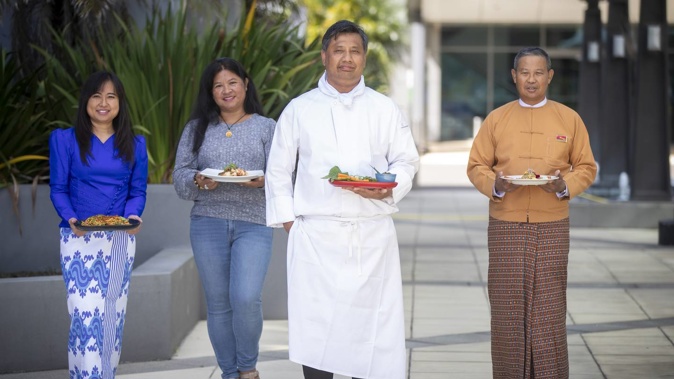
Two years after the Myanmar military junta coup that has already killed thousands, the local Burmese community is still fighting to have a visa pathway to bring their families to safety in New Zealand.
A symposium in Wellington tomorrow, with speakers that include former Prime Minister Helen Clark, will dive deep into the Myanmar crisis and explore possible pathways to democracy for the country.
Ross Wilson, chairman of UnionAID, one of the organisers, said the crisis in Myanmar requires urgent attention from the international community.
“With a collapsing economy, a brutal military regime, and millions displaced, the situation is dire,” Wilson said.
“This symposium will bring together experts to analyse the situation and explore viable pathways towards democracy.”
Wilson said the junta is continuing to wage a brutal war against its own people, and more than 1.2 million people have been internally displaced.
A United Nations report says 50 per cent of the population is living in poverty.
A large gathering outside Parliament protests against the military coup in Myanmar in 2021. Photo / Jack Crossland
The military regime is gearing up to hold elections this year, but it is seen as a move to consolidate control rather than a return to civilian rule.
- Myanmar military takes control of country; Suu Kyi detained
- Refugee crisis grows after violent military action in Myanmar
- Facebook restricts Myanmar military's accounts for spreading 'misinformation'
- No peace in Myanmar one year after military takeover
“These elections are unlikely to be credible and may exacerbate violence,” a UnionAID spokeswoman said.
“The symposium aims to analyse the complex situation, explore potential pathways to democracy, and look at the role of the international community.”
Clark will deliver her speech via a pre-recorded video, and other speakers include Victoria University of Wellington director of the Centre of Strategic Studies Professor David Capie, former NZ ambassador to Myanmar Stephen Marshall and Dr Tun-Aung Shwe, representing the National Unity Government of Myanmar.
The meeting will be held at Victoria University tomorrow from 9am to 5pm.
Anti-junta activist Swam Myaing, 59, who will be travelling to the symposium from Hamilton, said many Burmese are worried the conflict and their suffering is being forgotten as the junta still hold power two years after the coup.
“Every day many of us worry about whether we will see our family members again or whether they are even alive,” said Myaing, whose family are living in the jungle near Yangon to hide from the military.
“It’s sometimes very tough for us to hear how friends and relatives of many from our community are being killed, disappeared or tortured in Myanmar and we feel so helpless because we live far away here in NZ.”
Helen Clark will deliver a speech via video recording for the Myanmar Crisis symposium. Photo / Paul Taylor
Myaing said the community had been fighting for Immigration NZ to grant special temporary visas - similar to the one for Ukrainian New Zealanders to bring in their family members - but without success.
“I hope NZ can have a heart for Burmese people, to open the doors temporarily for families and the human rights defenders to escape the atrocities.”
Several from the local Burmese community declined to be interviewed or photographed for this report, citing fears that their families back in Myanmar could be targeted by the military if they did.
Over the past two years, the junta’s campaign of terror to crush widespread opposition to the coup included airstrikes, torching villages, and arresting more than 17,000 people.
In January, 16 survivors and witnesses of military abuses in Myanmar lodged a criminal complaint in Germany asking prosecutors to investigate and bring to trial those responsible for committing the atrocities.
According to Fortify Rights, the advocacy group that filed the complaint, it was lodged in Germany because of that country’s universal jurisdiction laws, which allow for the prosecution of certain grave crimes no matter where they take place.
The complaint provided new evidence that the military “systematically killed, raped, tortured, imprisoned, disappeared, persecuted and committed other acts that amount to genocide, crimes against humanity and war crimes”, the group’s chief executive, Matthew Smith, was quoted by Aljazeera as saying.
Aucklanders will get to experience a Thingyan Burmese New Year feast by Burmese chefs from Christchurch, Napier and Auckland with proceeds going to victims of the Myanmar conflict. Photo / Michael Craig
THINGYAN BURMESE NEW YEAR
Meanwhile, Burmese chefs across New Zealand will be coming together to cook up a dinner feast for an event in Auckland to raise funds to help victims of the conflict and celebrate Thingyan - or Burmese New Year.
Thu Ya, 47, head chef and co-owner of Rangoon Ruby in Christchurch, said this will be the first time Burmese chefs will be coming together in one place to cook for an event.
“Auckland does not have a Burmese restaurant, so we see this as a unique opportunity to share the unique dishes and special flavours from our homeland,” Thu Ya said.
“But what we want to do is to bring joy back to celebrating our new year, Thingyan, again. Since the coup, what was once a joyous time of the year has been filled with nothing but tears and fear.”
Just in the past week, Thu Ya said his neighbours back in Myanmar, who included an 80-year-old grandmother, were arrested on suspicion that they were against the military rulers.
“Nobody in Myanmar feels safe any more, and so even though Thingyan is our biggest festival, no one there dares to celebrate,” he said.
The ticketed Thingyan dinner will be at the Constellation Cafe in Albany on Saturday, May 6, with proceeds going to help survivors of the Myanmar conflict.
Take your Radio, Podcasts and Music with you

/cloudfront-ap-southeast-2.images.arcpublishing.com/nzme/5HKYZ6BCKFD5XC3OQLEG2UBKHI.JPG)
/cloudfront-ap-southeast-2.images.arcpublishing.com/nzme/SEERE7NR35CMHNITIUW5NDT7TI.JPG)
/cloudfront-ap-southeast-2.images.arcpublishing.com/nzme/7LF6ZLSSUNA3ZFLZ4P3JUXKY3A.JPG)








